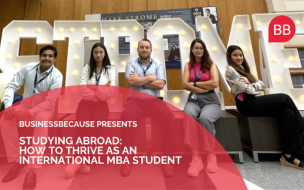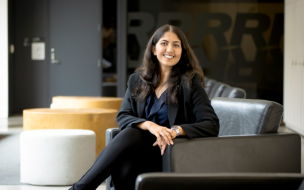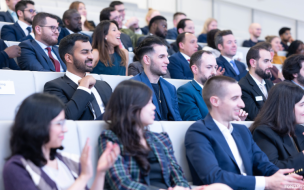The program's location in the center of Amsterdam places it at a nexus of European business and trade. Amsterdam can tap into 244 million consumers within a 1000 kilometer radius. It hosts the European headquarters of Nike, Tesla, and Cisco Systems. Forbes has just announced that its first Under 30 Summit Europe will be held there too.
Nyenrode's flagship European Immersion Modules are at the core of the school's change in focus to Europe. The aim is to immerse students in the pool of daily business life, augmenting their understanding of how theory is applied to real-time industry issues.
The MBA’s organization, leadership, and talent management component ends with an immersion module in Copenhagen. Students investigate these subjects in action at bodies such as the UN, or within nascent startups. Theories of digitalization, information, and innovation are brought to life at Google's headquarters in London.
Javier Arias, senior marketer at Nyenrode, notes the school's shift in focus came from observing that most students wanted to build their career on the continent.
"We realized that far away trips were good experience, but did not necessarily open up employment opportunities," Javier says. "Students weren't focusing on them. Our strength is our business network, particularly in Europe. So, we changed the program to offer students the opportunities they were coming here for."
Jeroen Plantinga, a current MBA student at Nyenrode, says this aspect of the program is especially appealing to European candidates.
"Although I may have a preference for Amsterdam at the moment, I want to have the option of exploring opportunities in the rest of Europe especially given that it's so easy to move to a different country in the EU."
Nyenrode Business Universiteit leverages a principle at the very heart of the European Union—freedom of movement.
In 2012, The Organization for Economic Co-operation and Development estimated that free movement had lowered average unemployment in Europe by 6%. Nyenrode's program aligns the career interests of European students with the rights they have as European citizens.
However, the program also gives students coming from outside of Europe a channel to explore opportunities across the region. Nawras Ali, an entrepreneur who started his first company at the age of 20 and completed his MBA in 2017, moved to the Netherlands as a Syrian refugee.
He was awarded a full scholarship for the program, and now works as an advisor in smart mobility for the Ministry of Infrastructure in the Netherlands.
"Coming from the Middle East, an international education with a European focus was very important for me,” Nawras explains. “I wanted to understand the driving factors behind the European economy and businesses, so that I could fit to the market I wanted to be in."
Jorge Hernandez, who worked in Unilever in Mexico, is a current MBA student at Nyenrode.
"I loved my job, but I decided to move to a country more than 9,000 kilometers away to achieve one of my most important personal and professional goals—to study an MBA," he says.
"After visiting several schools and analyzing different educational programs, I came to the conclusion that Nyenrode Business Universiteit was the best option for me due to the practical approach of their courses, their excellent teachers, the wide network of contacts that exist among their students, and the strong links between the university and companies.
“However, the determining factor was Nyenrode's European focus," Jorge states.
Globalization's momentum has consolidated the necessity of adopting a trans-national approach to growth. The EU constitutes a precedent for such regional cooperation and combined development, and Nyenrode's program offers candidates the opportunity to tap into and shape an exemplary trans-national project.
Jorge comments that the European Immersion Module is one of the most valuable aspects of the Nyenrode MBA.
"Students have the opportunity to travel to different cities in Europe, visit important companies in their industry, present business cases, and gain insights about the companies from different departments and perspectives,” he explains.
Jorge was pleasantly surprised by the openness of the companies. Their willingness to listen to the MBAs' ideas and concerns highlights a shift away from the traditional hierarchical structure, to one where the opinions of each tier of the labor ladder are valued equally.
“We are given the chance to talk directly with top management, have more personal conversations about our professional interests, and to keep in touch with them for future employment opportunities," Jorge explains.
"These visits are helping me to have a clearer idea of the kind of company that would be appropriate for me, in terms of structure, leadership, and organizational culture. It's made me think about the kind of environment that will capture my full potential."








